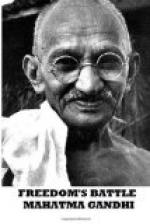The manifesto speaking of the secular aspect says, ’The history of nations affords no instance to show that it (meaning non-co-operation) has, when employed, succeeded and done good,’ One most recent instance of brilliant success of non-co-operation is that of General Botha who boycotted Lord Milner’s reformed councils and thereby procured a perfect constitution for his country. The Dukhobours of Russia offered non-co-operation, and a handful though they were, their grievances so deeply moved the civilized world that Canada offered them a home where they form a prosperous community. In India instances can be given by the dozen, in which in little principalities the raiyats when deeply grieved by their chiefs have cut off all connection with them and bent them to their will. I know of no instance in history where well-managed non-co-operation has failed.
Hitherto I have given historical instances of bloodless non-co-operation, I will not insult the intelligence of the reader by citing historical instances of non-co-operation combined with, violence, but I am free to confess that there are on record as many successes as failures in violent non-co-operation. And it is because I know this fact that I have placed before the country a non-violent scheme in which, if at all worked satisfactorily, success is a certainty and in which non-response means no harm. For if even one man non-co-operates, say, by resigning some office, he has gained, not lost. That is its ethical or religious aspect. For its political result naturally it requires polymerous support. I fear therefore no disastrous result from non-co-operation save for an outbreak of violence on the part of the people whether under provocation or otherwise. I would risk violence a thousand times than risk the emasculation of a whole race.




